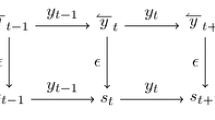Abstract
A deterministic message-communicating process can be characterised by a “continuous” functionf which describes the relationship between the inputs and the outputs of the process. The operational behaviour of a network of deterministic processes can be deduced from the least fixpoint of a functiong, whereg is obtained from the functions that characterise the component processes of the network. We show in this paper that a nondeter-ministic process can be characterised by a “description” consisting of a pair of functions. The behaviour of a network consisting of such processes can be obtained from the “smooth” solutions of the descriptions characterising its component processes. The notion of smooth solution is a generalisation of least fixpoint. Descriptions enjoy the crucial property that a variable may be replaced by its definition.
Similar content being viewed by others
References
Abramsky, S.: A Generalized Kahn Principle for Abstract Asynchronous Networks,Proc. Symp. on Mathematical Foundations of Programming Language Semantics, Tulane, New Orleans, May 1989.
Apt, K. R. and Plotkin, G. D.: Countable Nondeterminism and Random Assignment.J. ACM 33(4), 727–767 (1986).
Brock, J. D. and Ackerman, W. B.: Scenarios: a Model of Nondeterminate Computation, In:Formalization of Programming Concepts, J. Diaz and I. Ramos (eds), Lecture Notes in Computer Science,107, Springer-Verlag, 252–259, 1981.
Broy, M.: Semantics of Finite and Infinite Networks of Concurrent Communicating Agents.Distributed Computing 2, 13–31 (1987).
Chandy, K. M. and Misra, J.: Proofs of Networks of Processes.IEEE,SE-7:4, 417–426 (1981).
Chandy, K. M. and Misra, J.: Reasoning about Networks of Communicating Processes, Unpublished paper presented at INRIA Advanced Nato Study Institute on Logics and Models for Verification and Specification of Concurrent Systems, La Colle-sur-Loupe, France, 1984.
Dijkstra, E. W. and Scholten, C. S.:Predicate Calculus and Program Semantics, Springer-Verlag, 1989.
Gasteren, A. J. M. van: On the Shape of Mathematical Arguments, Ph.D. Dissertation, Technische Universiteit Eindhoven, 1988.
Hoare, C. A. R.:Communicating Sequential Processes, Prentice-Hall International, 1985.
Jonsson, B.: A Model and Proof System for Asynchronous Networks.Proc. 4th/ACM Symp. on Principles of Distributed Computing, Minaki, Candaa, 49–58, 1985.
Jonsson, B.: Modular Verification of Asynchronous Networks,Proc. 6th ACM Symp. on Principles of Distributed Computing, Vancouver, Canada, 152–166, 1987.
Jonsson, B.: A Fully Abstract Trace Model for Dataflow Networks,Proc. 16th Annual ACM Symp. on Principles of Programming Languages, Austin, Texas, January 1989.
Kahn, G.: The Semantics of a Simple Language for Parallel Programming,Proc. of IFIP Congress 74, North Holland, 1974.
Keller, R. M.: Denotational Models for Parallel Programs with Indeterminate Operators. InFormal Descriptions of Programming Concepts, E. J. Neuhold (ed.), North-Holland, 337–365, 1978.
Keller, P. M. and Panangaden, P.: Semantics of Networks Containing Indeterminate Operators,Distributed Computing,1, 235–245, 1986.
Kok, J. N.: A Fully Abstract Semantics for Data Flow Nets. In:Proc. PARLE, Lecture Notes in Computing Science 259, Springer-Verlag, 351–368, 1987.
Loeckx, J. and Sieber, K.:The Foundations of Program Verification, John Wiley and B. G. Teubner, 1984.
Lynch, N. A. and Stark, E. W.: A Proof of the Kahn Principle for Input/Output Automata, MIT/LCS/TM-349, January 1988.
Panagaden, P. and Stark, E. W.: Computations, Residuals, and the Power of Indeterminacy, TR87-883, Cornell University, November 1987.
Panangaden, P. and Shanbhogue, V.: On the Expressive Power of Indeterminate Network Primitives, TR87-891, Cornell University, December 1987.
Park, D.: The 'Fairness' Problem and Nondeterministic Computing Networks,Foundations of Computer Science IV Part 2, Amsterdam, Math. Centre Tracts 159, 133–161, 1982.
Plotkin, G.: A Power Domain Construction.SIAM J. Comput.,5, 452–487, 1976.
Rabinovich, A. and Trakhtenbrot, B. A.: Nets and Data Flow Interpreters,Proc. 4th Annual Symp. on Logic in Computer Science, Asilomar, California, 5–8 June 1989.
Scott, D: Outline of a Mathematical Theory of Computation,4th Annual Princeton Conf. Inform. Sc. and Systems, 169–176, 1970.
Staples, J. and Nguyen, V. N.: A Fixpoint Semantics for Nondeterministic Data Flow,J. ACM 32(2), 411–444 (1985).
Author information
Authors and Affiliations
Rights and permissions
About this article
Cite this article
Misra, J. Equational reasoning about nondeterministic processes. Formal Aspects of Computing 2, 167–195 (1990). https://doi.org/10.1007/BF01888222
Received:
Accepted:
Issue Date:
DOI: https://doi.org/10.1007/BF01888222




